Leadership and Management for Service Industries: Econo Lodge Report
VerifiedAdded on 2022/11/24
|11
|3861
|69
Report
AI Summary
This report provides a detailed analysis of leadership and management within the service industry, specifically using the Econo Lodge hotel as a case study. It begins by exploring classical management theories, such as scientific management, bureaucratic management, and administrative management, and their practical application within the service sector. The report then delves into various leadership styles, including autocratic, laissez-faire, participatory, and transformational leadership, evaluating their effectiveness in the context of service-oriented businesses. It further examines different management styles like persuasive and collaborative approaches, alongside specific leadership styles such as democratic and participatory, illustrating their impact on employee productivity and overall organizational success. The investigation extends to internal and external factors influencing management structure, including technology, human resources, cultural aspects, cross-cultural activities, and legal considerations. The report also identifies essential hard and soft management skills needed in the service industry, such as computer and management skills. Finally, it concludes with a discussion on change management systems and the future of leadership and management in the service industry.
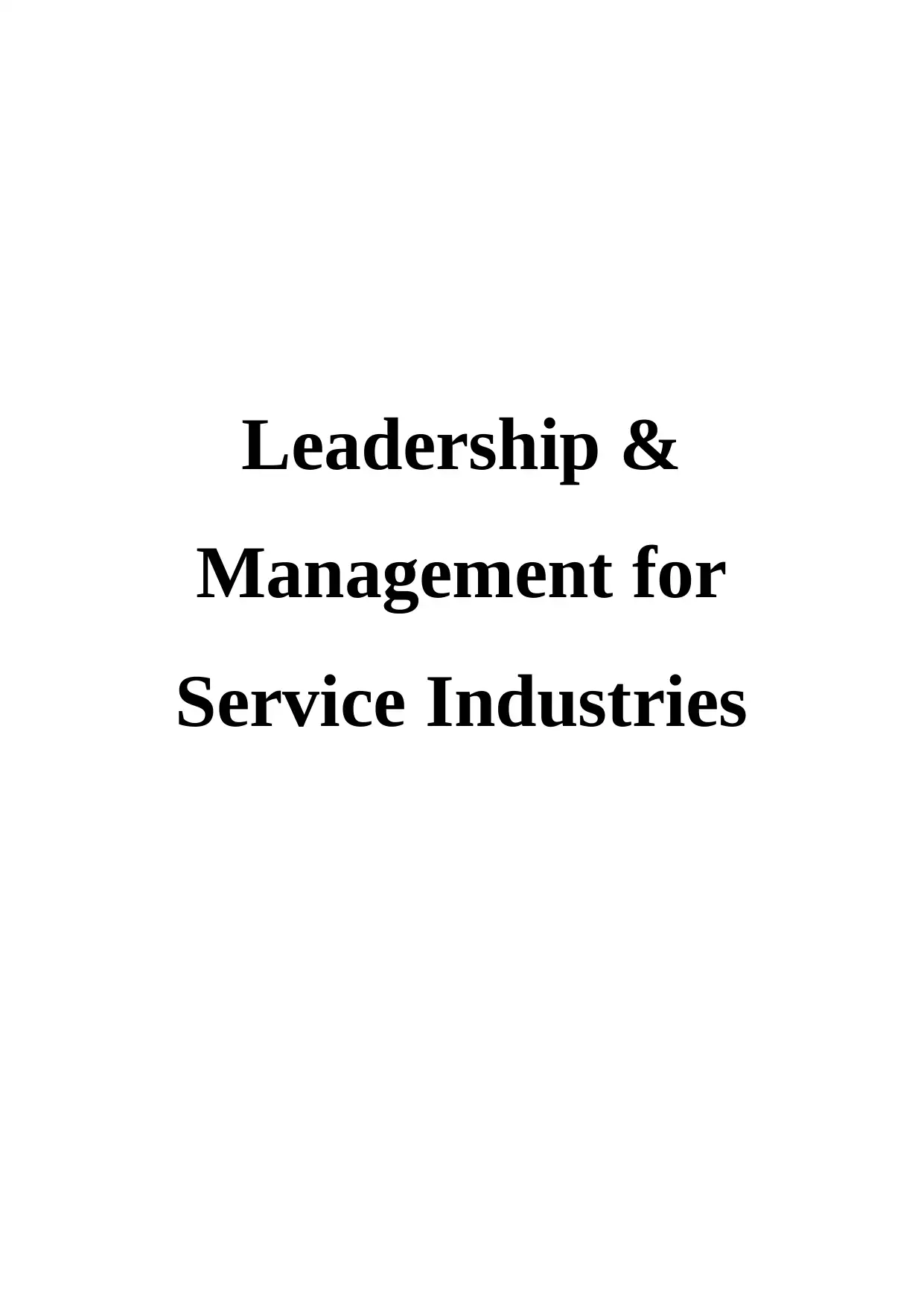
Leadership &
Management for
Service Industries
Management for
Service Industries
Paraphrase This Document
Need a fresh take? Get an instant paraphrase of this document with our AI Paraphraser
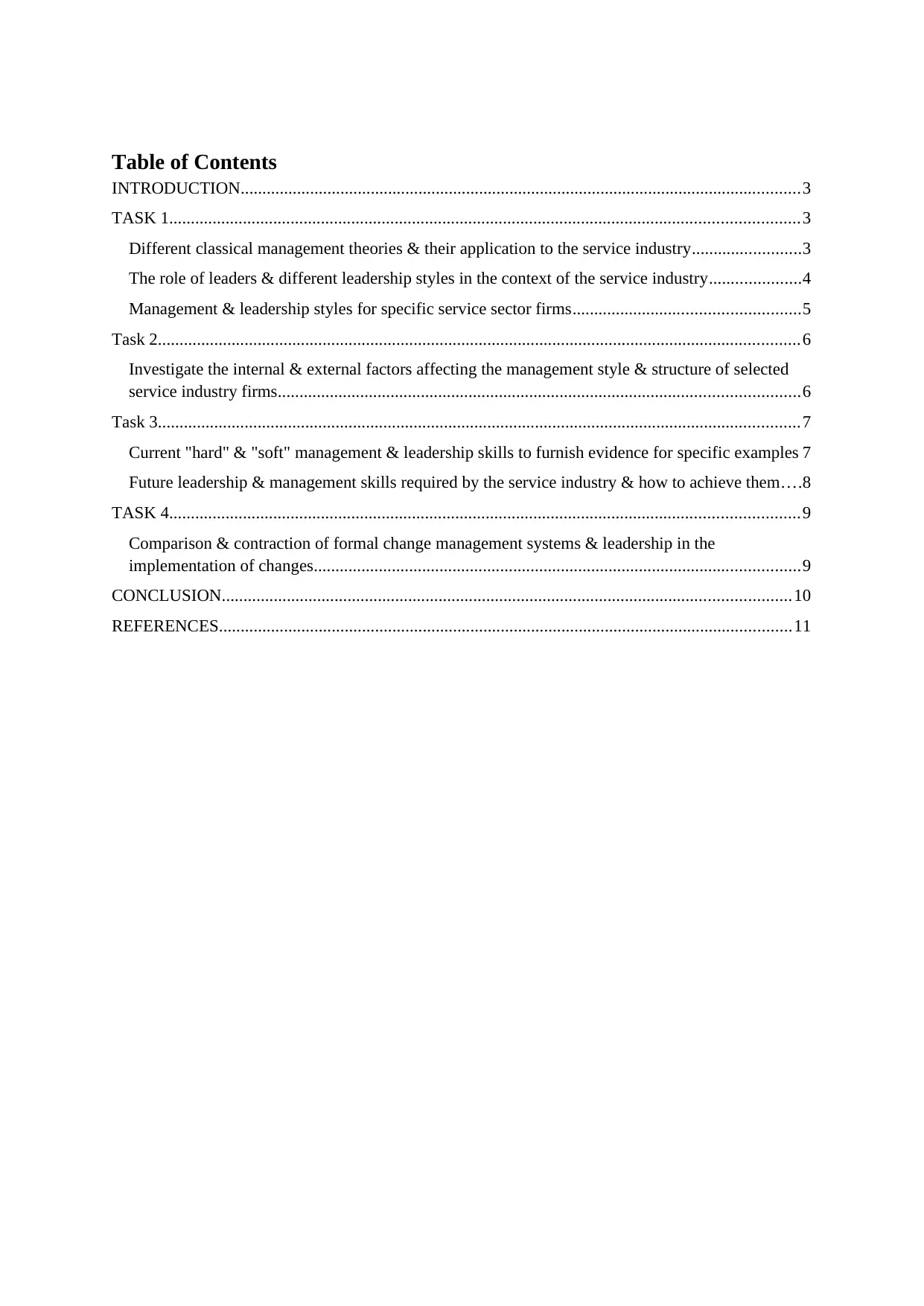
Table of Contents
INTRODUCTION.................................................................................................................................3
TASK 1.................................................................................................................................................3
Different classical management theories & their application to the service industry.........................3
The role of leaders & different leadership styles in the context of the service industry.....................4
Management & leadership styles for specific service sector firms....................................................5
Task 2....................................................................................................................................................6
Investigate the internal & external factors affecting the management style & structure of selected
service industry firms........................................................................................................................6
Task 3....................................................................................................................................................7
Current "hard" & "soft" management & leadership skills to furnish evidence for specific examples 7
Future leadership & management skills required by the service industry & how to achieve them....8
TASK 4.................................................................................................................................................9
Comparison & contraction of formal change management systems & leadership in the
implementation of changes................................................................................................................9
CONCLUSION...................................................................................................................................10
REFERENCES....................................................................................................................................11
INTRODUCTION.................................................................................................................................3
TASK 1.................................................................................................................................................3
Different classical management theories & their application to the service industry.........................3
The role of leaders & different leadership styles in the context of the service industry.....................4
Management & leadership styles for specific service sector firms....................................................5
Task 2....................................................................................................................................................6
Investigate the internal & external factors affecting the management style & structure of selected
service industry firms........................................................................................................................6
Task 3....................................................................................................................................................7
Current "hard" & "soft" management & leadership skills to furnish evidence for specific examples 7
Future leadership & management skills required by the service industry & how to achieve them....8
TASK 4.................................................................................................................................................9
Comparison & contraction of formal change management systems & leadership in the
implementation of changes................................................................................................................9
CONCLUSION...................................................................................................................................10
REFERENCES....................................................................................................................................11
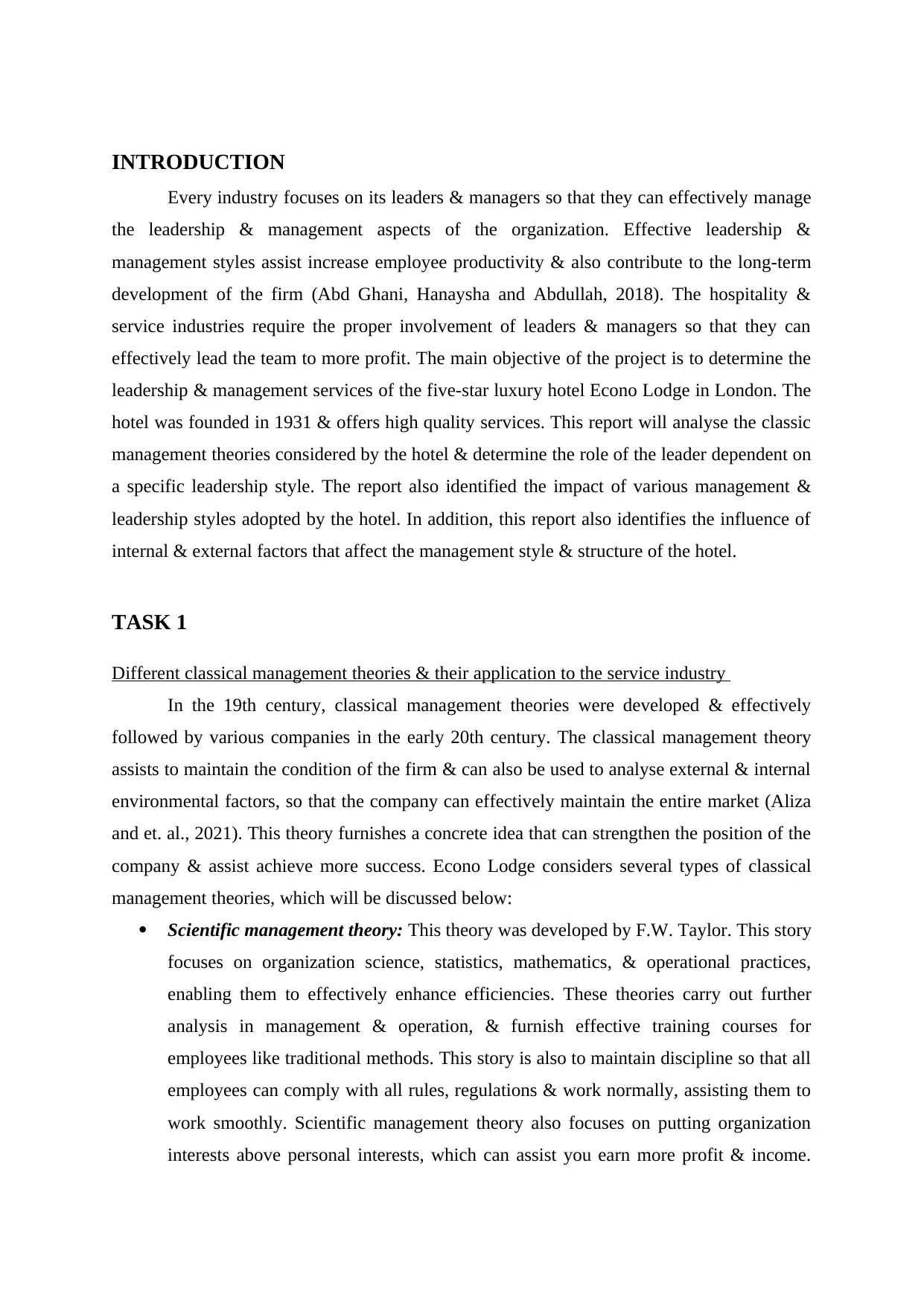
INTRODUCTION
Every industry focuses on its leaders & managers so that they can effectively manage
the leadership & management aspects of the organization. Effective leadership &
management styles assist increase employee productivity & also contribute to the long-term
development of the firm (Abd Ghani, Hanaysha and Abdullah, 2018). The hospitality &
service industries require the proper involvement of leaders & managers so that they can
effectively lead the team to more profit. The main objective of the project is to determine the
leadership & management services of the five-star luxury hotel Econo Lodge in London. The
hotel was founded in 1931 & offers high quality services. This report will analyse the classic
management theories considered by the hotel & determine the role of the leader dependent on
a specific leadership style. The report also identified the impact of various management &
leadership styles adopted by the hotel. In addition, this report also identifies the influence of
internal & external factors that affect the management style & structure of the hotel.
TASK 1
Different classical management theories & their application to the service industry
In the 19th century, classical management theories were developed & effectively
followed by various companies in the early 20th century. The classical management theory
assists to maintain the condition of the firm & can also be used to analyse external & internal
environmental factors, so that the company can effectively maintain the entire market (Aliza
and et. al., 2021). This theory furnishes a concrete idea that can strengthen the position of the
company & assist achieve more success. Econo Lodge considers several types of classical
management theories, which will be discussed below:
Scientific management theory: This theory was developed by F.W. Taylor. This story
focuses on organization science, statistics, mathematics, & operational practices,
enabling them to effectively enhance efficiencies. These theories carry out further
analysis in management & operation, & furnish effective training courses for
employees like traditional methods. This story is also to maintain discipline so that all
employees can comply with all rules, regulations & work normally, assisting them to
work smoothly. Scientific management theory also focuses on putting organization
interests above personal interests, which can assist you earn more profit & income.
Every industry focuses on its leaders & managers so that they can effectively manage
the leadership & management aspects of the organization. Effective leadership &
management styles assist increase employee productivity & also contribute to the long-term
development of the firm (Abd Ghani, Hanaysha and Abdullah, 2018). The hospitality &
service industries require the proper involvement of leaders & managers so that they can
effectively lead the team to more profit. The main objective of the project is to determine the
leadership & management services of the five-star luxury hotel Econo Lodge in London. The
hotel was founded in 1931 & offers high quality services. This report will analyse the classic
management theories considered by the hotel & determine the role of the leader dependent on
a specific leadership style. The report also identified the impact of various management &
leadership styles adopted by the hotel. In addition, this report also identifies the influence of
internal & external factors that affect the management style & structure of the hotel.
TASK 1
Different classical management theories & their application to the service industry
In the 19th century, classical management theories were developed & effectively
followed by various companies in the early 20th century. The classical management theory
assists to maintain the condition of the firm & can also be used to analyse external & internal
environmental factors, so that the company can effectively maintain the entire market (Aliza
and et. al., 2021). This theory furnishes a concrete idea that can strengthen the position of the
company & assist achieve more success. Econo Lodge considers several types of classical
management theories, which will be discussed below:
Scientific management theory: This theory was developed by F.W. Taylor. This story
focuses on organization science, statistics, mathematics, & operational practices,
enabling them to effectively enhance efficiencies. These theories carry out further
analysis in management & operation, & furnish effective training courses for
employees like traditional methods. This story is also to maintain discipline so that all
employees can comply with all rules, regulations & work normally, assisting them to
work smoothly. Scientific management theory also focuses on putting organization
interests above personal interests, which can assist you earn more profit & income.
⊘ This is a preview!⊘
Do you want full access?
Subscribe today to unlock all pages.

Trusted by 1+ million students worldwide
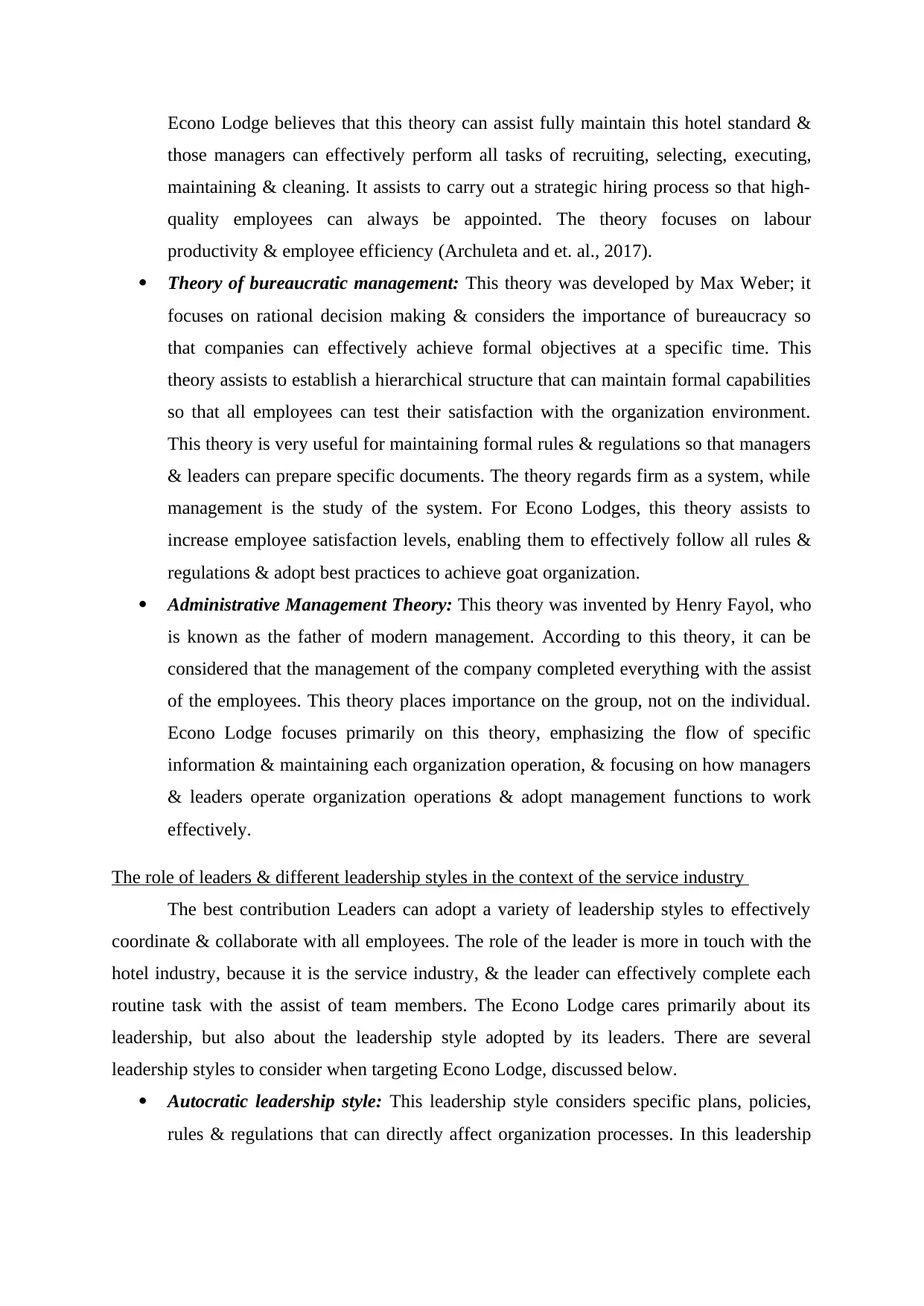
Econo Lodge believes that this theory can assist fully maintain this hotel standard &
those managers can effectively perform all tasks of recruiting, selecting, executing,
maintaining & cleaning. It assists to carry out a strategic hiring process so that high-
quality employees can always be appointed. The theory focuses on labour
productivity & employee efficiency (Archuleta and et. al., 2017).
Theory of bureaucratic management: This theory was developed by Max Weber; it
focuses on rational decision making & considers the importance of bureaucracy so
that companies can effectively achieve formal objectives at a specific time. This
theory assists to establish a hierarchical structure that can maintain formal capabilities
so that all employees can test their satisfaction with the organization environment.
This theory is very useful for maintaining formal rules & regulations so that managers
& leaders can prepare specific documents. The theory regards firm as a system, while
management is the study of the system. For Econo Lodges, this theory assists to
increase employee satisfaction levels, enabling them to effectively follow all rules &
regulations & adopt best practices to achieve goat organization.
Administrative Management Theory: This theory was invented by Henry Fayol, who
is known as the father of modern management. According to this theory, it can be
considered that the management of the company completed everything with the assist
of the employees. This theory places importance on the group, not on the individual.
Econo Lodge focuses primarily on this theory, emphasizing the flow of specific
information & maintaining each organization operation, & focusing on how managers
& leaders operate organization operations & adopt management functions to work
effectively.
The role of leaders & different leadership styles in the context of the service industry
The best contribution Leaders can adopt a variety of leadership styles to effectively
coordinate & collaborate with all employees. The role of the leader is more in touch with the
hotel industry, because it is the service industry, & the leader can effectively complete each
routine task with the assist of team members. The Econo Lodge cares primarily about its
leadership, but also about the leadership style adopted by its leaders. There are several
leadership styles to consider when targeting Econo Lodge, discussed below.
Autocratic leadership style: This leadership style considers specific plans, policies,
rules & regulations that can directly affect organization processes. In this leadership
those managers can effectively perform all tasks of recruiting, selecting, executing,
maintaining & cleaning. It assists to carry out a strategic hiring process so that high-
quality employees can always be appointed. The theory focuses on labour
productivity & employee efficiency (Archuleta and et. al., 2017).
Theory of bureaucratic management: This theory was developed by Max Weber; it
focuses on rational decision making & considers the importance of bureaucracy so
that companies can effectively achieve formal objectives at a specific time. This
theory assists to establish a hierarchical structure that can maintain formal capabilities
so that all employees can test their satisfaction with the organization environment.
This theory is very useful for maintaining formal rules & regulations so that managers
& leaders can prepare specific documents. The theory regards firm as a system, while
management is the study of the system. For Econo Lodges, this theory assists to
increase employee satisfaction levels, enabling them to effectively follow all rules &
regulations & adopt best practices to achieve goat organization.
Administrative Management Theory: This theory was invented by Henry Fayol, who
is known as the father of modern management. According to this theory, it can be
considered that the management of the company completed everything with the assist
of the employees. This theory places importance on the group, not on the individual.
Econo Lodge focuses primarily on this theory, emphasizing the flow of specific
information & maintaining each organization operation, & focusing on how managers
& leaders operate organization operations & adopt management functions to work
effectively.
The role of leaders & different leadership styles in the context of the service industry
The best contribution Leaders can adopt a variety of leadership styles to effectively
coordinate & collaborate with all employees. The role of the leader is more in touch with the
hotel industry, because it is the service industry, & the leader can effectively complete each
routine task with the assist of team members. The Econo Lodge cares primarily about its
leadership, but also about the leadership style adopted by its leaders. There are several
leadership styles to consider when targeting Econo Lodge, discussed below.
Autocratic leadership style: This leadership style considers specific plans, policies,
rules & regulations that can directly affect organization processes. In this leadership
Paraphrase This Document
Need a fresh take? Get an instant paraphrase of this document with our AI Paraphraser
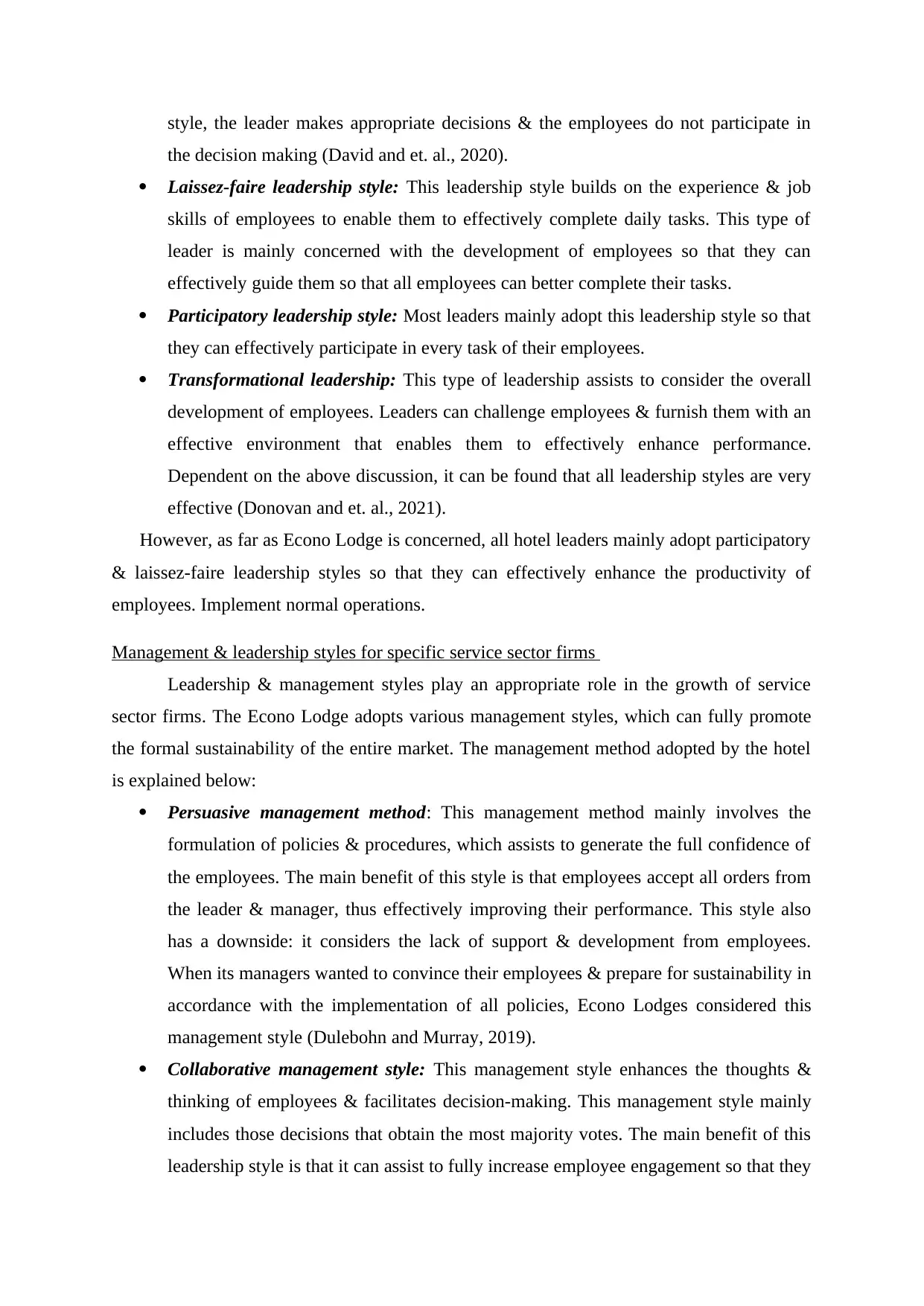
style, the leader makes appropriate decisions & the employees do not participate in
the decision making (David and et. al., 2020).
Laissez-faire leadership style: This leadership style builds on the experience & job
skills of employees to enable them to effectively complete daily tasks. This type of
leader is mainly concerned with the development of employees so that they can
effectively guide them so that all employees can better complete their tasks.
Participatory leadership style: Most leaders mainly adopt this leadership style so that
they can effectively participate in every task of their employees.
Transformational leadership: This type of leadership assists to consider the overall
development of employees. Leaders can challenge employees & furnish them with an
effective environment that enables them to effectively enhance performance.
Dependent on the above discussion, it can be found that all leadership styles are very
effective (Donovan and et. al., 2021).
However, as far as Econo Lodge is concerned, all hotel leaders mainly adopt participatory
& laissez-faire leadership styles so that they can effectively enhance the productivity of
employees. Implement normal operations.
Management & leadership styles for specific service sector firms
Leadership & management styles play an appropriate role in the growth of service
sector firms. The Econo Lodge adopts various management styles, which can fully promote
the formal sustainability of the entire market. The management method adopted by the hotel
is explained below:
Persuasive management method: This management method mainly involves the
formulation of policies & procedures, which assists to generate the full confidence of
the employees. The main benefit of this style is that employees accept all orders from
the leader & manager, thus effectively improving their performance. This style also
has a downside: it considers the lack of support & development from employees.
When its managers wanted to convince their employees & prepare for sustainability in
accordance with the implementation of all policies, Econo Lodges considered this
management style (Dulebohn and Murray, 2019).
Collaborative management style: This management style enhances the thoughts &
thinking of employees & facilitates decision-making. This management style mainly
includes those decisions that obtain the most majority votes. The main benefit of this
leadership style is that it can assist to fully increase employee engagement so that they
the decision making (David and et. al., 2020).
Laissez-faire leadership style: This leadership style builds on the experience & job
skills of employees to enable them to effectively complete daily tasks. This type of
leader is mainly concerned with the development of employees so that they can
effectively guide them so that all employees can better complete their tasks.
Participatory leadership style: Most leaders mainly adopt this leadership style so that
they can effectively participate in every task of their employees.
Transformational leadership: This type of leadership assists to consider the overall
development of employees. Leaders can challenge employees & furnish them with an
effective environment that enables them to effectively enhance performance.
Dependent on the above discussion, it can be found that all leadership styles are very
effective (Donovan and et. al., 2021).
However, as far as Econo Lodge is concerned, all hotel leaders mainly adopt participatory
& laissez-faire leadership styles so that they can effectively enhance the productivity of
employees. Implement normal operations.
Management & leadership styles for specific service sector firms
Leadership & management styles play an appropriate role in the growth of service
sector firms. The Econo Lodge adopts various management styles, which can fully promote
the formal sustainability of the entire market. The management method adopted by the hotel
is explained below:
Persuasive management method: This management method mainly involves the
formulation of policies & procedures, which assists to generate the full confidence of
the employees. The main benefit of this style is that employees accept all orders from
the leader & manager, thus effectively improving their performance. This style also
has a downside: it considers the lack of support & development from employees.
When its managers wanted to convince their employees & prepare for sustainability in
accordance with the implementation of all policies, Econo Lodges considered this
management style (Dulebohn and Murray, 2019).
Collaborative management style: This management style enhances the thoughts &
thinking of employees & facilitates decision-making. This management style mainly
includes those decisions that obtain the most majority votes. The main benefit of this
leadership style is that it can assist to fully increase employee engagement so that they
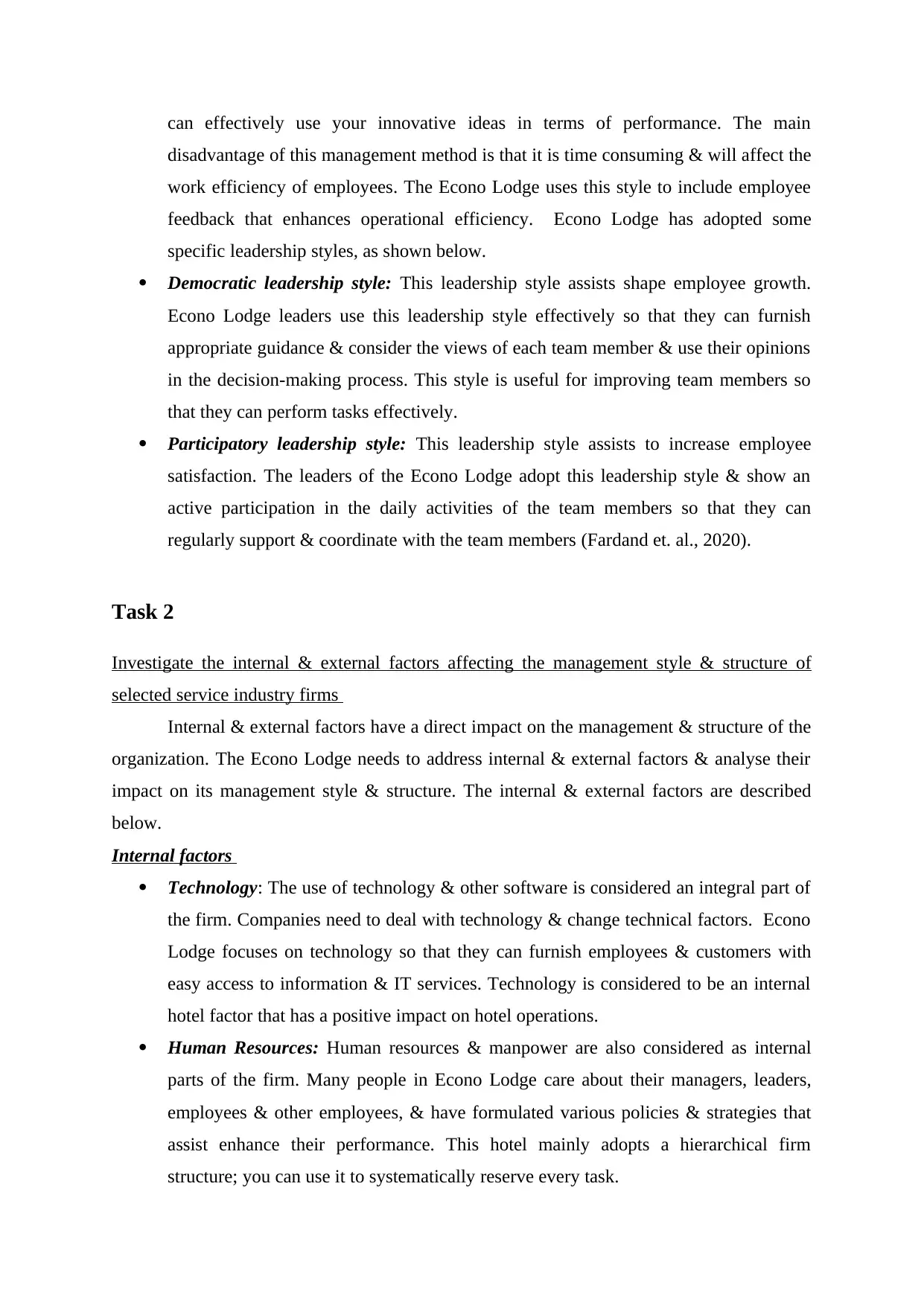
can effectively use your innovative ideas in terms of performance. The main
disadvantage of this management method is that it is time consuming & will affect the
work efficiency of employees. The Econo Lodge uses this style to include employee
feedback that enhances operational efficiency. Econo Lodge has adopted some
specific leadership styles, as shown below.
Democratic leadership style: This leadership style assists shape employee growth.
Econo Lodge leaders use this leadership style effectively so that they can furnish
appropriate guidance & consider the views of each team member & use their opinions
in the decision-making process. This style is useful for improving team members so
that they can perform tasks effectively.
Participatory leadership style: This leadership style assists to increase employee
satisfaction. The leaders of the Econo Lodge adopt this leadership style & show an
active participation in the daily activities of the team members so that they can
regularly support & coordinate with the team members (Fardand et. al., 2020).
Task 2
Investigate the internal & external factors affecting the management style & structure of
selected service industry firms
Internal & external factors have a direct impact on the management & structure of the
organization. The Econo Lodge needs to address internal & external factors & analyse their
impact on its management style & structure. The internal & external factors are described
below.
Internal factors
Technology: The use of technology & other software is considered an integral part of
the firm. Companies need to deal with technology & change technical factors. Econo
Lodge focuses on technology so that they can furnish employees & customers with
easy access to information & IT services. Technology is considered to be an internal
hotel factor that has a positive impact on hotel operations.
Human Resources: Human resources & manpower are also considered as internal
parts of the firm. Many people in Econo Lodge care about their managers, leaders,
employees & other employees, & have formulated various policies & strategies that
assist enhance their performance. This hotel mainly adopts a hierarchical firm
structure; you can use it to systematically reserve every task.
disadvantage of this management method is that it is time consuming & will affect the
work efficiency of employees. The Econo Lodge uses this style to include employee
feedback that enhances operational efficiency. Econo Lodge has adopted some
specific leadership styles, as shown below.
Democratic leadership style: This leadership style assists shape employee growth.
Econo Lodge leaders use this leadership style effectively so that they can furnish
appropriate guidance & consider the views of each team member & use their opinions
in the decision-making process. This style is useful for improving team members so
that they can perform tasks effectively.
Participatory leadership style: This leadership style assists to increase employee
satisfaction. The leaders of the Econo Lodge adopt this leadership style & show an
active participation in the daily activities of the team members so that they can
regularly support & coordinate with the team members (Fardand et. al., 2020).
Task 2
Investigate the internal & external factors affecting the management style & structure of
selected service industry firms
Internal & external factors have a direct impact on the management & structure of the
organization. The Econo Lodge needs to address internal & external factors & analyse their
impact on its management style & structure. The internal & external factors are described
below.
Internal factors
Technology: The use of technology & other software is considered an integral part of
the firm. Companies need to deal with technology & change technical factors. Econo
Lodge focuses on technology so that they can furnish employees & customers with
easy access to information & IT services. Technology is considered to be an internal
hotel factor that has a positive impact on hotel operations.
Human Resources: Human resources & manpower are also considered as internal
parts of the firm. Many people in Econo Lodge care about their managers, leaders,
employees & other employees, & have formulated various policies & strategies that
assist enhance their performance. This hotel mainly adopts a hierarchical firm
structure; you can use it to systematically reserve every task.
⊘ This is a preview!⊘
Do you want full access?
Subscribe today to unlock all pages.

Trusted by 1+ million students worldwide
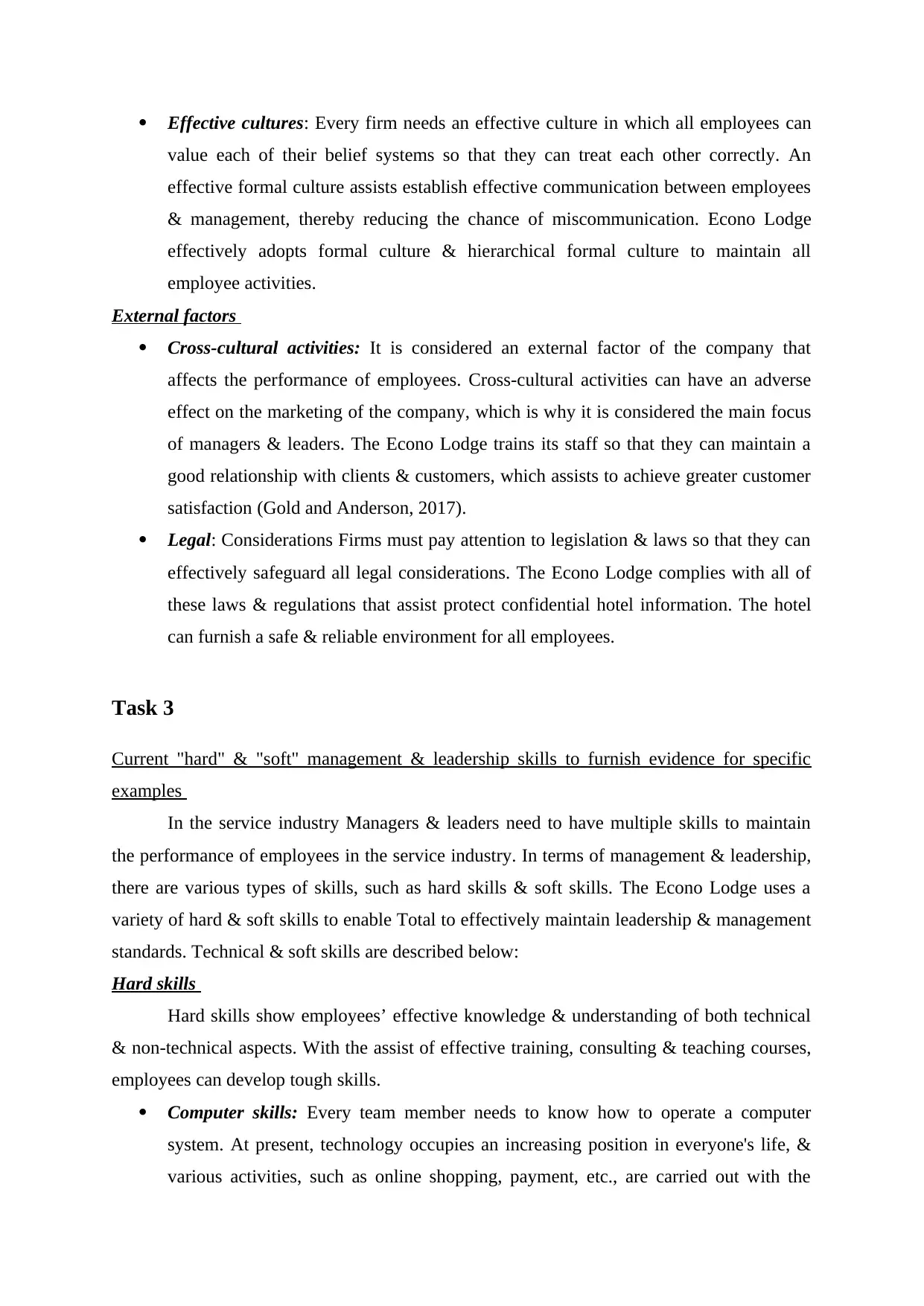
Effective cultures: Every firm needs an effective culture in which all employees can
value each of their belief systems so that they can treat each other correctly. An
effective formal culture assists establish effective communication between employees
& management, thereby reducing the chance of miscommunication. Econo Lodge
effectively adopts formal culture & hierarchical formal culture to maintain all
employee activities.
External factors
Cross-cultural activities: It is considered an external factor of the company that
affects the performance of employees. Cross-cultural activities can have an adverse
effect on the marketing of the company, which is why it is considered the main focus
of managers & leaders. The Econo Lodge trains its staff so that they can maintain a
good relationship with clients & customers, which assists to achieve greater customer
satisfaction (Gold and Anderson, 2017).
Legal: Considerations Firms must pay attention to legislation & laws so that they can
effectively safeguard all legal considerations. The Econo Lodge complies with all of
these laws & regulations that assist protect confidential hotel information. The hotel
can furnish a safe & reliable environment for all employees.
Task 3
Current "hard" & "soft" management & leadership skills to furnish evidence for specific
examples
In the service industry Managers & leaders need to have multiple skills to maintain
the performance of employees in the service industry. In terms of management & leadership,
there are various types of skills, such as hard skills & soft skills. The Econo Lodge uses a
variety of hard & soft skills to enable Total to effectively maintain leadership & management
standards. Technical & soft skills are described below:
Hard skills
Hard skills show employees’ effective knowledge & understanding of both technical
& non-technical aspects. With the assist of effective training, consulting & teaching courses,
employees can develop tough skills.
Computer skills: Every team member needs to know how to operate a computer
system. At present, technology occupies an increasing position in everyone's life, &
various activities, such as online shopping, payment, etc., are carried out with the
value each of their belief systems so that they can treat each other correctly. An
effective formal culture assists establish effective communication between employees
& management, thereby reducing the chance of miscommunication. Econo Lodge
effectively adopts formal culture & hierarchical formal culture to maintain all
employee activities.
External factors
Cross-cultural activities: It is considered an external factor of the company that
affects the performance of employees. Cross-cultural activities can have an adverse
effect on the marketing of the company, which is why it is considered the main focus
of managers & leaders. The Econo Lodge trains its staff so that they can maintain a
good relationship with clients & customers, which assists to achieve greater customer
satisfaction (Gold and Anderson, 2017).
Legal: Considerations Firms must pay attention to legislation & laws so that they can
effectively safeguard all legal considerations. The Econo Lodge complies with all of
these laws & regulations that assist protect confidential hotel information. The hotel
can furnish a safe & reliable environment for all employees.
Task 3
Current "hard" & "soft" management & leadership skills to furnish evidence for specific
examples
In the service industry Managers & leaders need to have multiple skills to maintain
the performance of employees in the service industry. In terms of management & leadership,
there are various types of skills, such as hard skills & soft skills. The Econo Lodge uses a
variety of hard & soft skills to enable Total to effectively maintain leadership & management
standards. Technical & soft skills are described below:
Hard skills
Hard skills show employees’ effective knowledge & understanding of both technical
& non-technical aspects. With the assist of effective training, consulting & teaching courses,
employees can develop tough skills.
Computer skills: Every team member needs to know how to operate a computer
system. At present, technology occupies an increasing position in everyone's life, &
various activities, such as online shopping, payment, etc., are carried out with the
Paraphrase This Document
Need a fresh take? Get an instant paraphrase of this document with our AI Paraphraser
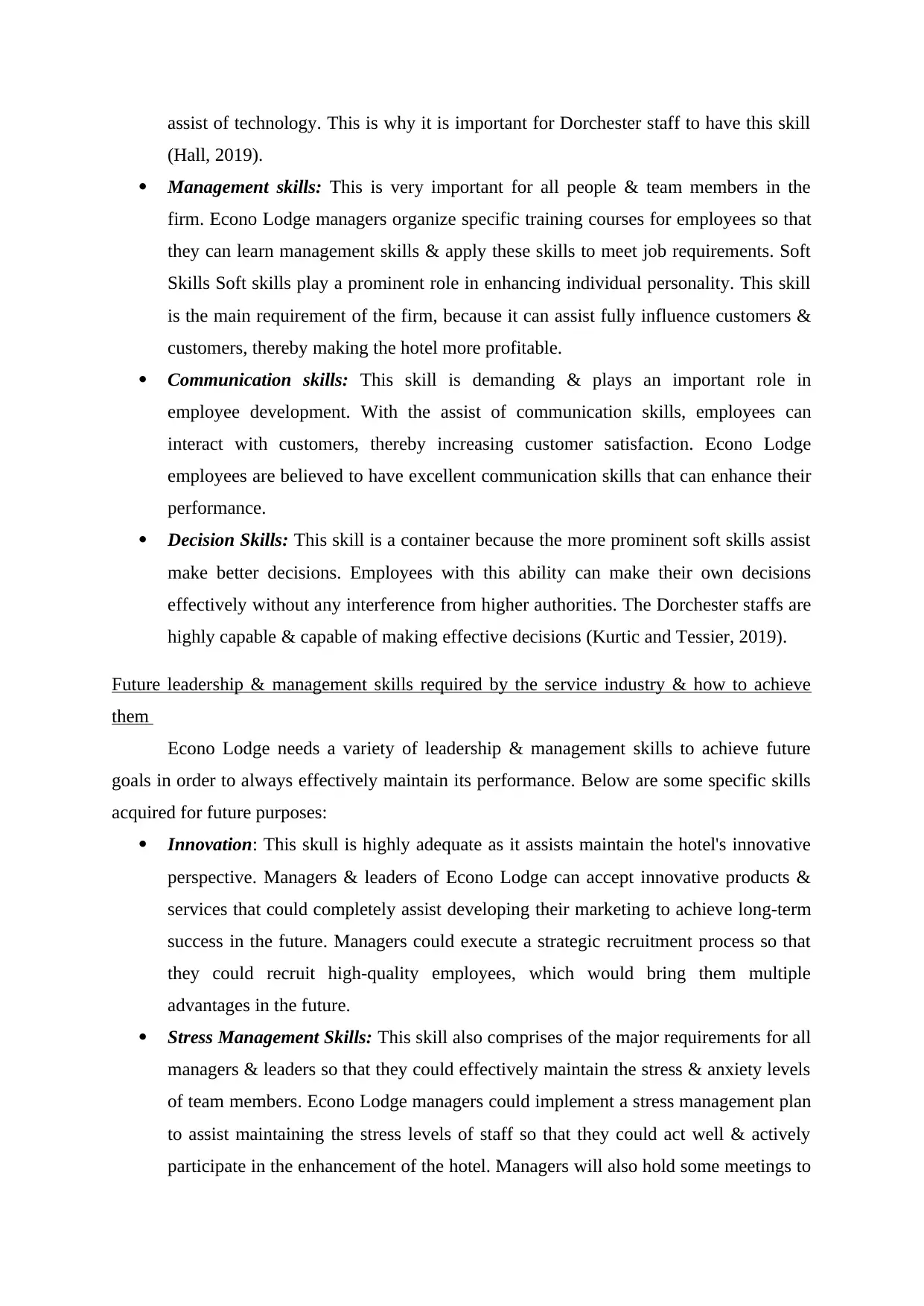
assist of technology. This is why it is important for Dorchester staff to have this skill
(Hall, 2019).
Management skills: This is very important for all people & team members in the
firm. Econo Lodge managers organize specific training courses for employees so that
they can learn management skills & apply these skills to meet job requirements. Soft
Skills Soft skills play a prominent role in enhancing individual personality. This skill
is the main requirement of the firm, because it can assist fully influence customers &
customers, thereby making the hotel more profitable.
Communication skills: This skill is demanding & plays an important role in
employee development. With the assist of communication skills, employees can
interact with customers, thereby increasing customer satisfaction. Econo Lodge
employees are believed to have excellent communication skills that can enhance their
performance.
Decision Skills: This skill is a container because the more prominent soft skills assist
make better decisions. Employees with this ability can make their own decisions
effectively without any interference from higher authorities. The Dorchester staffs are
highly capable & capable of making effective decisions (Kurtic and Tessier, 2019).
Future leadership & management skills required by the service industry & how to achieve
them
Econo Lodge needs a variety of leadership & management skills to achieve future
goals in order to always effectively maintain its performance. Below are some specific skills
acquired for future purposes:
Innovation: This skull is highly adequate as it assists maintain the hotel's innovative
perspective. Managers & leaders of Econo Lodge can accept innovative products &
services that could completely assist developing their marketing to achieve long-term
success in the future. Managers could execute a strategic recruitment process so that
they could recruit high-quality employees, which would bring them multiple
advantages in the future.
Stress Management Skills: This skill also comprises of the major requirements for all
managers & leaders so that they could effectively maintain the stress & anxiety levels
of team members. Econo Lodge managers could implement a stress management plan
to assist maintaining the stress levels of staff so that they could act well & actively
participate in the enhancement of the hotel. Managers will also hold some meetings to
(Hall, 2019).
Management skills: This is very important for all people & team members in the
firm. Econo Lodge managers organize specific training courses for employees so that
they can learn management skills & apply these skills to meet job requirements. Soft
Skills Soft skills play a prominent role in enhancing individual personality. This skill
is the main requirement of the firm, because it can assist fully influence customers &
customers, thereby making the hotel more profitable.
Communication skills: This skill is demanding & plays an important role in
employee development. With the assist of communication skills, employees can
interact with customers, thereby increasing customer satisfaction. Econo Lodge
employees are believed to have excellent communication skills that can enhance their
performance.
Decision Skills: This skill is a container because the more prominent soft skills assist
make better decisions. Employees with this ability can make their own decisions
effectively without any interference from higher authorities. The Dorchester staffs are
highly capable & capable of making effective decisions (Kurtic and Tessier, 2019).
Future leadership & management skills required by the service industry & how to achieve
them
Econo Lodge needs a variety of leadership & management skills to achieve future
goals in order to always effectively maintain its performance. Below are some specific skills
acquired for future purposes:
Innovation: This skull is highly adequate as it assists maintain the hotel's innovative
perspective. Managers & leaders of Econo Lodge can accept innovative products &
services that could completely assist developing their marketing to achieve long-term
success in the future. Managers could execute a strategic recruitment process so that
they could recruit high-quality employees, which would bring them multiple
advantages in the future.
Stress Management Skills: This skill also comprises of the major requirements for all
managers & leaders so that they could effectively maintain the stress & anxiety levels
of team members. Econo Lodge managers could implement a stress management plan
to assist maintaining the stress levels of staff so that they could act well & actively
participate in the enhancement of the hotel. Managers will also hold some meetings to
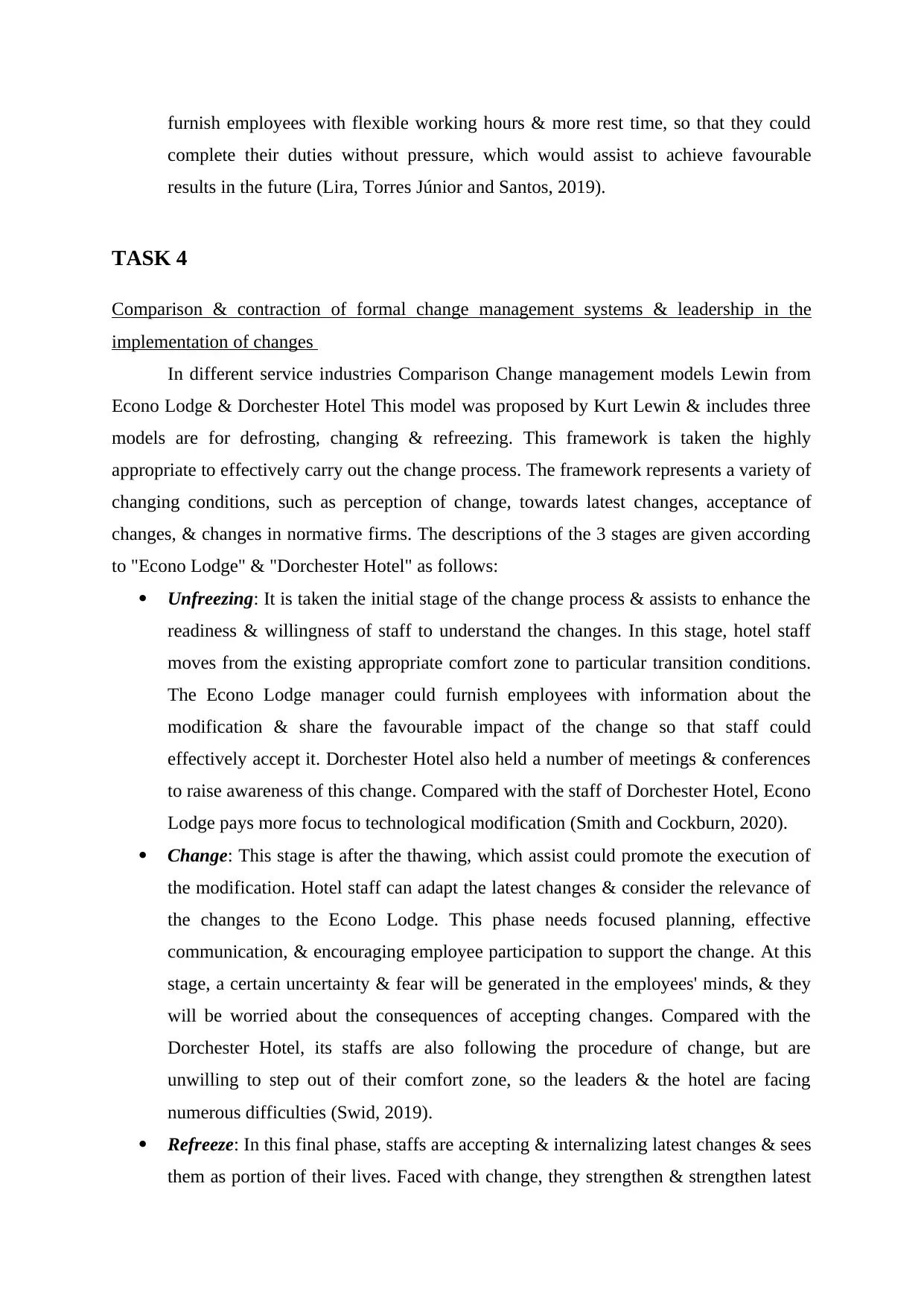
furnish employees with flexible working hours & more rest time, so that they could
complete their duties without pressure, which would assist to achieve favourable
results in the future (Lira, Torres Júnior and Santos, 2019).
TASK 4
Comparison & contraction of formal change management systems & leadership in the
implementation of changes
In different service industries Comparison Change management models Lewin from
Econo Lodge & Dorchester Hotel This model was proposed by Kurt Lewin & includes three
models are for defrosting, changing & refreezing. This framework is taken the highly
appropriate to effectively carry out the change process. The framework represents a variety of
changing conditions, such as perception of change, towards latest changes, acceptance of
changes, & changes in normative firms. The descriptions of the 3 stages are given according
to "Econo Lodge" & "Dorchester Hotel" as follows:
Unfreezing: It is taken the initial stage of the change process & assists to enhance the
readiness & willingness of staff to understand the changes. In this stage, hotel staff
moves from the existing appropriate comfort zone to particular transition conditions.
The Econo Lodge manager could furnish employees with information about the
modification & share the favourable impact of the change so that staff could
effectively accept it. Dorchester Hotel also held a number of meetings & conferences
to raise awareness of this change. Compared with the staff of Dorchester Hotel, Econo
Lodge pays more focus to technological modification (Smith and Cockburn, 2020).
Change: This stage is after the thawing, which assist could promote the execution of
the modification. Hotel staff can adapt the latest changes & consider the relevance of
the changes to the Econo Lodge. This phase needs focused planning, effective
communication, & encouraging employee participation to support the change. At this
stage, a certain uncertainty & fear will be generated in the employees' minds, & they
will be worried about the consequences of accepting changes. Compared with the
Dorchester Hotel, its staffs are also following the procedure of change, but are
unwilling to step out of their comfort zone, so the leaders & the hotel are facing
numerous difficulties (Swid, 2019).
Refreeze: In this final phase, staffs are accepting & internalizing latest changes & sees
them as portion of their lives. Faced with change, they strengthen & strengthen latest
complete their duties without pressure, which would assist to achieve favourable
results in the future (Lira, Torres Júnior and Santos, 2019).
TASK 4
Comparison & contraction of formal change management systems & leadership in the
implementation of changes
In different service industries Comparison Change management models Lewin from
Econo Lodge & Dorchester Hotel This model was proposed by Kurt Lewin & includes three
models are for defrosting, changing & refreezing. This framework is taken the highly
appropriate to effectively carry out the change process. The framework represents a variety of
changing conditions, such as perception of change, towards latest changes, acceptance of
changes, & changes in normative firms. The descriptions of the 3 stages are given according
to "Econo Lodge" & "Dorchester Hotel" as follows:
Unfreezing: It is taken the initial stage of the change process & assists to enhance the
readiness & willingness of staff to understand the changes. In this stage, hotel staff
moves from the existing appropriate comfort zone to particular transition conditions.
The Econo Lodge manager could furnish employees with information about the
modification & share the favourable impact of the change so that staff could
effectively accept it. Dorchester Hotel also held a number of meetings & conferences
to raise awareness of this change. Compared with the staff of Dorchester Hotel, Econo
Lodge pays more focus to technological modification (Smith and Cockburn, 2020).
Change: This stage is after the thawing, which assist could promote the execution of
the modification. Hotel staff can adapt the latest changes & consider the relevance of
the changes to the Econo Lodge. This phase needs focused planning, effective
communication, & encouraging employee participation to support the change. At this
stage, a certain uncertainty & fear will be generated in the employees' minds, & they
will be worried about the consequences of accepting changes. Compared with the
Dorchester Hotel, its staffs are also following the procedure of change, but are
unwilling to step out of their comfort zone, so the leaders & the hotel are facing
numerous difficulties (Swid, 2019).
Refreeze: In this final phase, staffs are accepting & internalizing latest changes & sees
them as portion of their lives. Faced with change, they strengthen & strengthen latest
⊘ This is a preview!⊘
Do you want full access?
Subscribe today to unlock all pages.

Trusted by 1+ million students worldwide
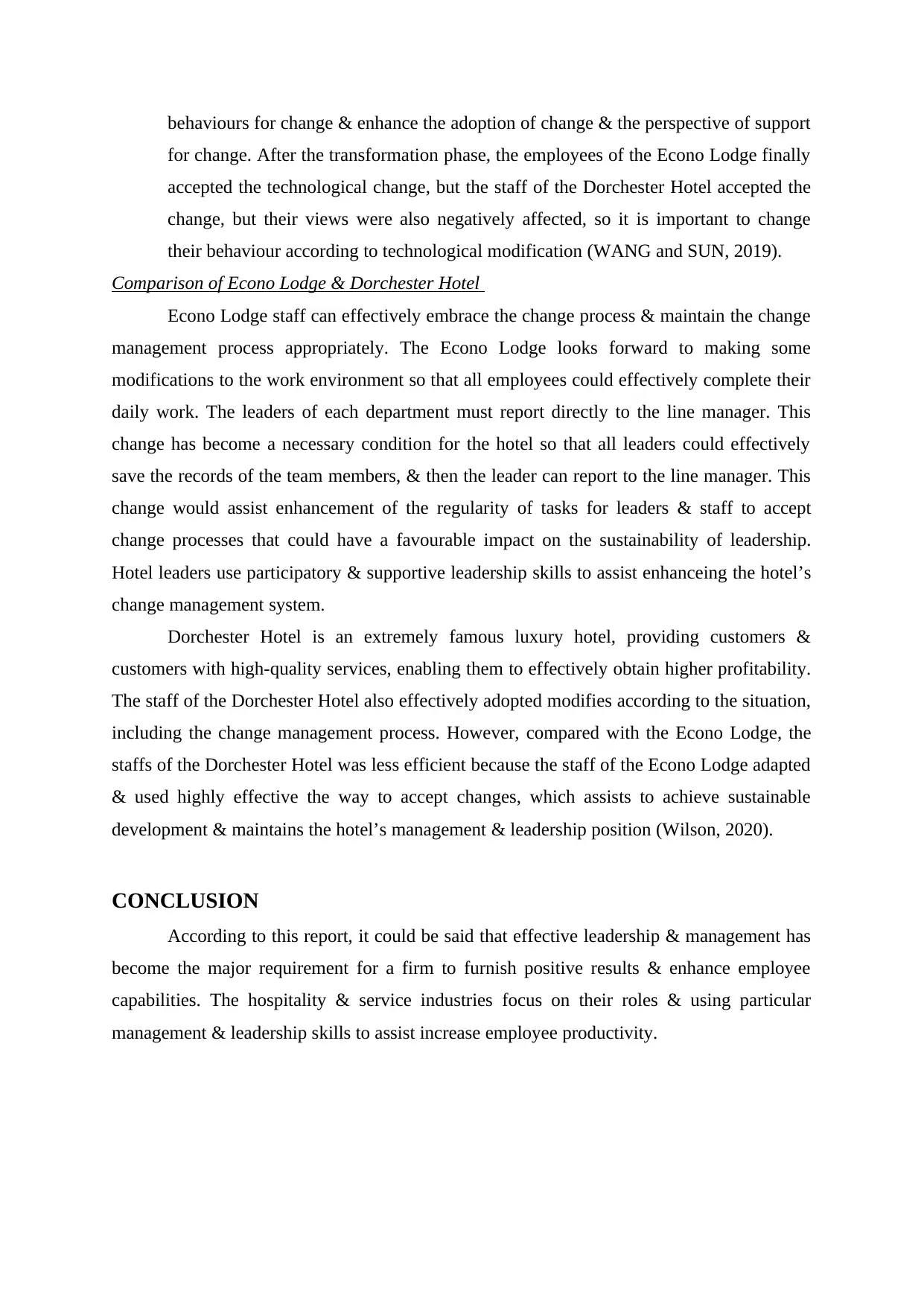
behaviours for change & enhance the adoption of change & the perspective of support
for change. After the transformation phase, the employees of the Econo Lodge finally
accepted the technological change, but the staff of the Dorchester Hotel accepted the
change, but their views were also negatively affected, so it is important to change
their behaviour according to technological modification (WANG and SUN, 2019).
Comparison of Econo Lodge & Dorchester Hotel
Econo Lodge staff can effectively embrace the change process & maintain the change
management process appropriately. The Econo Lodge looks forward to making some
modifications to the work environment so that all employees could effectively complete their
daily work. The leaders of each department must report directly to the line manager. This
change has become a necessary condition for the hotel so that all leaders could effectively
save the records of the team members, & then the leader can report to the line manager. This
change would assist enhancement of the regularity of tasks for leaders & staff to accept
change processes that could have a favourable impact on the sustainability of leadership.
Hotel leaders use participatory & supportive leadership skills to assist enhanceing the hotel’s
change management system.
Dorchester Hotel is an extremely famous luxury hotel, providing customers &
customers with high-quality services, enabling them to effectively obtain higher profitability.
The staff of the Dorchester Hotel also effectively adopted modifies according to the situation,
including the change management process. However, compared with the Econo Lodge, the
staffs of the Dorchester Hotel was less efficient because the staff of the Econo Lodge adapted
& used highly effective the way to accept changes, which assists to achieve sustainable
development & maintains the hotel’s management & leadership position (Wilson, 2020).
CONCLUSION
According to this report, it could be said that effective leadership & management has
become the major requirement for a firm to furnish positive results & enhance employee
capabilities. The hospitality & service industries focus on their roles & using particular
management & leadership skills to assist increase employee productivity.
for change. After the transformation phase, the employees of the Econo Lodge finally
accepted the technological change, but the staff of the Dorchester Hotel accepted the
change, but their views were also negatively affected, so it is important to change
their behaviour according to technological modification (WANG and SUN, 2019).
Comparison of Econo Lodge & Dorchester Hotel
Econo Lodge staff can effectively embrace the change process & maintain the change
management process appropriately. The Econo Lodge looks forward to making some
modifications to the work environment so that all employees could effectively complete their
daily work. The leaders of each department must report directly to the line manager. This
change has become a necessary condition for the hotel so that all leaders could effectively
save the records of the team members, & then the leader can report to the line manager. This
change would assist enhancement of the regularity of tasks for leaders & staff to accept
change processes that could have a favourable impact on the sustainability of leadership.
Hotel leaders use participatory & supportive leadership skills to assist enhanceing the hotel’s
change management system.
Dorchester Hotel is an extremely famous luxury hotel, providing customers &
customers with high-quality services, enabling them to effectively obtain higher profitability.
The staff of the Dorchester Hotel also effectively adopted modifies according to the situation,
including the change management process. However, compared with the Econo Lodge, the
staffs of the Dorchester Hotel was less efficient because the staff of the Econo Lodge adapted
& used highly effective the way to accept changes, which assists to achieve sustainable
development & maintains the hotel’s management & leadership position (Wilson, 2020).
CONCLUSION
According to this report, it could be said that effective leadership & management has
become the major requirement for a firm to furnish positive results & enhance employee
capabilities. The hospitality & service industries focus on their roles & using particular
management & leadership skills to assist increase employee productivity.
Paraphrase This Document
Need a fresh take? Get an instant paraphrase of this document with our AI Paraphraser
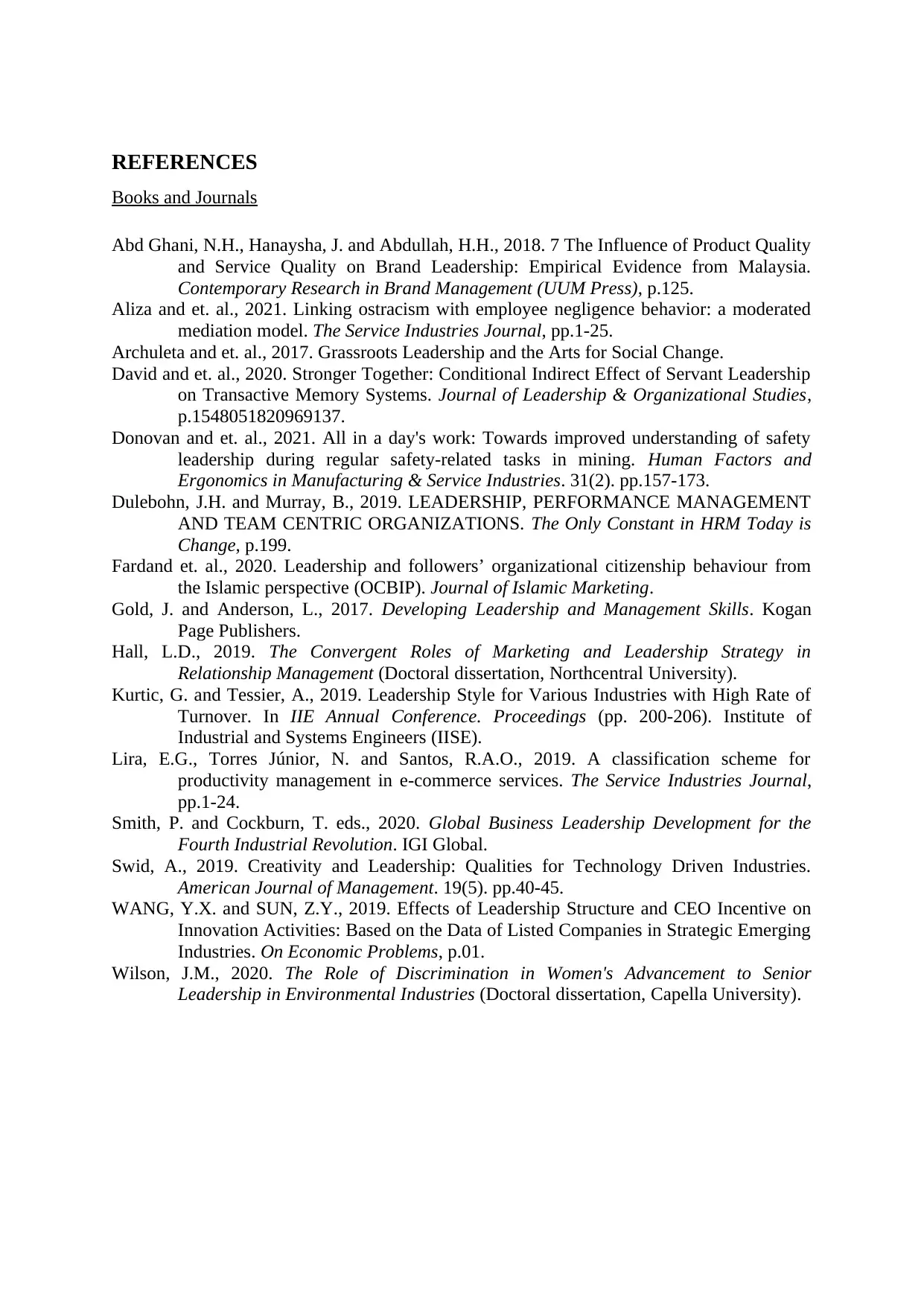
REFERENCES
Books and Journals
Abd Ghani, N.H., Hanaysha, J. and Abdullah, H.H., 2018. 7 The Influence of Product Quality
and Service Quality on Brand Leadership: Empirical Evidence from Malaysia.
Contemporary Research in Brand Management (UUM Press), p.125.
Aliza and et. al., 2021. Linking ostracism with employee negligence behavior: a moderated
mediation model. The Service Industries Journal, pp.1-25.
Archuleta and et. al., 2017. Grassroots Leadership and the Arts for Social Change.
David and et. al., 2020. Stronger Together: Conditional Indirect Effect of Servant Leadership
on Transactive Memory Systems. Journal of Leadership & Organizational Studies,
p.1548051820969137.
Donovan and et. al., 2021. All in a day's work: Towards improved understanding of safety
leadership during regular safety‐related tasks in mining. Human Factors and
Ergonomics in Manufacturing & Service Industries. 31(2). pp.157-173.
Dulebohn, J.H. and Murray, B., 2019. LEADERSHIP, PERFORMANCE MANAGEMENT
AND TEAM CENTRIC ORGANIZATIONS. The Only Constant in HRM Today is
Change, p.199.
Fardand et. al., 2020. Leadership and followers’ organizational citizenship behaviour from
the Islamic perspective (OCBIP). Journal of Islamic Marketing.
Gold, J. and Anderson, L., 2017. Developing Leadership and Management Skills. Kogan
Page Publishers.
Hall, L.D., 2019. The Convergent Roles of Marketing and Leadership Strategy in
Relationship Management (Doctoral dissertation, Northcentral University).
Kurtic, G. and Tessier, A., 2019. Leadership Style for Various Industries with High Rate of
Turnover. In IIE Annual Conference. Proceedings (pp. 200-206). Institute of
Industrial and Systems Engineers (IISE).
Lira, E.G., Torres Júnior, N. and Santos, R.A.O., 2019. A classification scheme for
productivity management in e-commerce services. The Service Industries Journal,
pp.1-24.
Smith, P. and Cockburn, T. eds., 2020. Global Business Leadership Development for the
Fourth Industrial Revolution. IGI Global.
Swid, A., 2019. Creativity and Leadership: Qualities for Technology Driven Industries.
American Journal of Management. 19(5). pp.40-45.
WANG, Y.X. and SUN, Z.Y., 2019. Effects of Leadership Structure and CEO Incentive on
Innovation Activities: Based on the Data of Listed Companies in Strategic Emerging
Industries. On Economic Problems, p.01.
Wilson, J.M., 2020. The Role of Discrimination in Women's Advancement to Senior
Leadership in Environmental Industries (Doctoral dissertation, Capella University).
Books and Journals
Abd Ghani, N.H., Hanaysha, J. and Abdullah, H.H., 2018. 7 The Influence of Product Quality
and Service Quality on Brand Leadership: Empirical Evidence from Malaysia.
Contemporary Research in Brand Management (UUM Press), p.125.
Aliza and et. al., 2021. Linking ostracism with employee negligence behavior: a moderated
mediation model. The Service Industries Journal, pp.1-25.
Archuleta and et. al., 2017. Grassroots Leadership and the Arts for Social Change.
David and et. al., 2020. Stronger Together: Conditional Indirect Effect of Servant Leadership
on Transactive Memory Systems. Journal of Leadership & Organizational Studies,
p.1548051820969137.
Donovan and et. al., 2021. All in a day's work: Towards improved understanding of safety
leadership during regular safety‐related tasks in mining. Human Factors and
Ergonomics in Manufacturing & Service Industries. 31(2). pp.157-173.
Dulebohn, J.H. and Murray, B., 2019. LEADERSHIP, PERFORMANCE MANAGEMENT
AND TEAM CENTRIC ORGANIZATIONS. The Only Constant in HRM Today is
Change, p.199.
Fardand et. al., 2020. Leadership and followers’ organizational citizenship behaviour from
the Islamic perspective (OCBIP). Journal of Islamic Marketing.
Gold, J. and Anderson, L., 2017. Developing Leadership and Management Skills. Kogan
Page Publishers.
Hall, L.D., 2019. The Convergent Roles of Marketing and Leadership Strategy in
Relationship Management (Doctoral dissertation, Northcentral University).
Kurtic, G. and Tessier, A., 2019. Leadership Style for Various Industries with High Rate of
Turnover. In IIE Annual Conference. Proceedings (pp. 200-206). Institute of
Industrial and Systems Engineers (IISE).
Lira, E.G., Torres Júnior, N. and Santos, R.A.O., 2019. A classification scheme for
productivity management in e-commerce services. The Service Industries Journal,
pp.1-24.
Smith, P. and Cockburn, T. eds., 2020. Global Business Leadership Development for the
Fourth Industrial Revolution. IGI Global.
Swid, A., 2019. Creativity and Leadership: Qualities for Technology Driven Industries.
American Journal of Management. 19(5). pp.40-45.
WANG, Y.X. and SUN, Z.Y., 2019. Effects of Leadership Structure and CEO Incentive on
Innovation Activities: Based on the Data of Listed Companies in Strategic Emerging
Industries. On Economic Problems, p.01.
Wilson, J.M., 2020. The Role of Discrimination in Women's Advancement to Senior
Leadership in Environmental Industries (Doctoral dissertation, Capella University).
1 out of 11
Related Documents
Your All-in-One AI-Powered Toolkit for Academic Success.
+13062052269
info@desklib.com
Available 24*7 on WhatsApp / Email
![[object Object]](/_next/static/media/star-bottom.7253800d.svg)
Unlock your academic potential
Copyright © 2020–2026 A2Z Services. All Rights Reserved. Developed and managed by ZUCOL.





